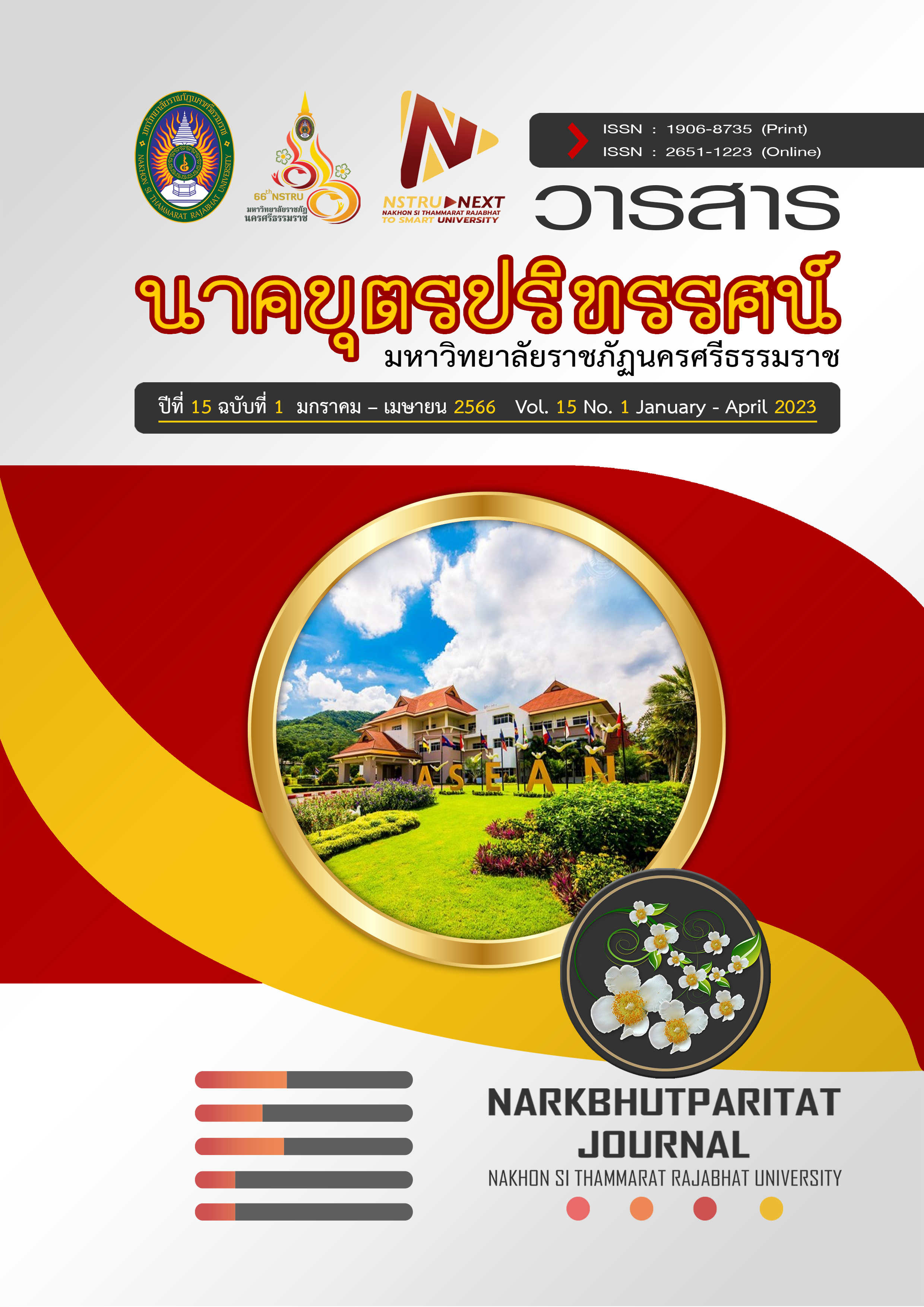รูปแบบการพัฒนาการจัดการตลาดชุมชนใต้โหนดอย่างยั่งยืน เพื่อการท่องเที่ยวเชิงวัฒนธรรม
Main Article Content
บทคัดย่อ
ดุษฎีนิพนธ์เรื่อง “รูปแบบการพัฒนาการจัดการตลาดชุมชนใต้โหนดอย่างยั่งยืนเพื่อการท่องเที่ยวเชิงวัฒนธรรม” มีวัตถุประสงค์ดังนี้ 1) เพื่อศึกษาแนวคิดและทฤษฎีการตลาดเพื่อความยั่งยืน 2) เพื่อศึกษาการจัดการตลาดชุมชนใต้โหนดอย่างยั่งยืนเพื่อการท่องเที่ยวเชิงวัฒนธรรม 3) เพื่อนำเสนอองค์ความรู้เกี่ยวกับ “รูปแบบการพัฒนาการจัดการตลาดชุมชนใต้โหนดอย่างยั่งยืนเพื่อการท่องเที่ยวเชิงวัฒนธรรม” เป็นงานวิจัยเชิงคุณภาพ ใช้แบบสัมภาษณ์ในการสัมภาษณ์เชิงลึก และการจัดทำเสวนากลุ่ม จากผู้ทรงคุณวุฒิ จำนวน 16 รูป/คน
ผลการวิจัยพบว่า แนวคิดและทฤษฎีการตลาดเพื่อความยั่งยืน เป็นกระบวนการที่ทำให้เกิดการตลาดเพื่อความยั่งยืน โดยใช้กระบวนการทางด้านการติดต่อสื่อสารทางการตลาด การเปลี่ยนแปลงความเชื่อ ทัศนคติ ความรู้สึกและพฤติกรรมของกลุ่มเป้าหมาย โดยการจัดการตลาดใต้โหนดอย่างยั่งยืนเพื่อการท่องเที่ยวเชิงวัฒนธรรม ยึดหลักองค์ประกอบของความยั่งยืน 4 ด้าน คือ ด้านความอยู่รอดทางเศรษฐกิจ ความเสมอภาคทางสังคม การปกป้องสิ่งแวดล้อม และด้านการส่งเสริมวัฒนธรรม อาศัยส่วนประสมการตลาดอย่างยั่งยืน ด้วยการวางแผน การจัดองค์กร การบังคับบัญชา การประสานงาน การจัดให้ทรัพยากรบุคคล และการควบคุมติดตาม เพื่อนำไปสู่กระบวนการในการตลาดอย่างยั่งยืนผสานหลักธรรมตามแนวพระพุทธศาสนา ด้วยกระบวนการเรียนรู้ การปรับทัศนคติ การส่งเสริมวัฒนธรรมท้องถิ่น การมีส่วนร่วมของภาคีเครือข่ายทางสังคม และการพัฒนาเพื่อนำสู่การเปลี่ยนแปลง โดยผลการ บูรณาการ พบว่า กระบวนการจัดการตามหลักการพัฒนา 4 ด้าน คือ ด้านเศรษฐกิจ สังคม สิ่งแวดล้อม และวัฒนธรรมผสานหลักธรรม นำสู่รูปแบบการพัฒนาการจัดการตลาดชุมชนใต้โหนดอย่างยั่งยืนเพื่อการท่องเที่ยวเชิงวัฒนธรรม องค์ความรู้ที่ได้คือ คือ “TAINOD MODEL” คือ T = TEAM (การทำงานร่วมกันเป็นทีม ภาคีเครือข่าย), A = ATTITUDE (การปรับทัศนคติในการทำงาน), I = INCOME (การกระจายรายได้สู่ชุมชน), N = NORM (วิถีการดำเนินชีวิต บริบทพื้นที่), O = OPPORTUNITY (การมีส่วนร่วมทางสังคม), D = DEVELOPMENT (การพัฒนาการปรับเปลี่ยน)
Article Details

อนุญาตภายใต้เงื่อนไข Creative Commons Attribution-NonCommercial-NoDerivatives 4.0 International License.
เอกสารอ้างอิง
Burawat, K. (2020). Dharma principles and strong community development. Mahamakut Wittayalai University Sirindhorn Wittayalai Campus. Sirindhorn Prismatic Journal. 21(2). 387-394. (in Thai)
Community-Based Sustainable Tourism Strategic Plan 2016-2021. (CBT Thailand). (2016). Retrieved from 2020, Feb 10, www.ryt9.com. (in Thai)
Department of Internal Trade. (2016). Operation Manual Community Marketing Project forLocal Businesses “Market must see”. Bangkok: Ministry of Commerce.
Department of Tourism. (2015). Summary of Tourist Situation, March 2015. Bangkok: Ministry of Tourism and Sports.
Keeratinwanan, S. (2014). The process of strengthening community welfare based on Chinese
identity. Case study of Bo Bae community. (Doctor of Philosophy), Thammasat University Faculty of Social Work, Social Administration, Graduate School.
Keawket, W. (2016). Self-management of the community market. A case study of Khlong Dan Riverside Market, Ranot District, Songkhla Province. (Master of Community Development Thesis), Thammasat University, Department of Community Development.
Ministry of Tourism and Sports. (2015). Thai Tourism Strategy 2015-2017. Retrieved from 2020,
Feb 10, www.mots.go.th/ewt_dl_link.php?nid=7114 (in Thai) Nuanthong, K. (2016). The work of the concept of "Hundred Sai Pinto to Build Networks and Community Market". Retrieved from 2020, March 31, www.pandinthong.com/knowledgebase-dwl-th/381591791792 (in Thai)
Songsomphan, K. (2017). Lard Tai Node. MCOT: Naga.
Tesaniratisai, W. (2020). Marketing Strategies to Support Thailand 4.0 Standard. Western University Research Journal Humanities and Social Sciences, 6(2), 232-243. (in Thai)
Tancharoen, S. (2018). Community-based tourism management and sustainable tourism development. of the Bang Khan Taek community Samut Songkhram Province. Academic Journal of Phetchaburi Rajabhat University, 12(3),149-158. (in Thai)


